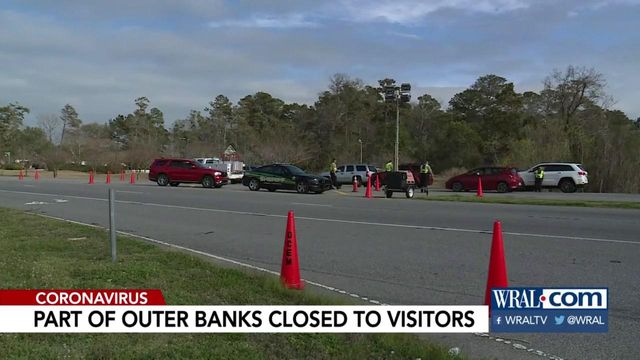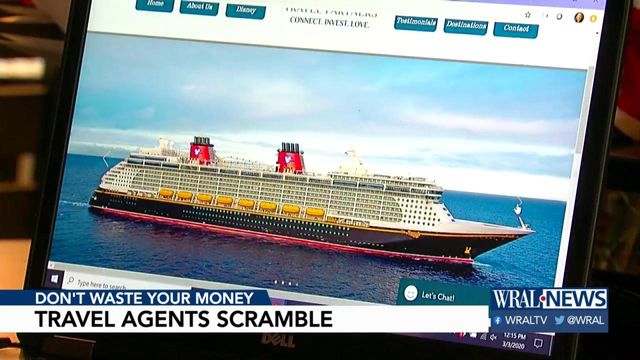Spring break dream turns nightmare for UNC students in long, worrisome return from EU
This was a trip we had been planning and saving for for months. As college students, this was set to be a Spring Break of a lifetime. In the span of a few hours, it turned into a nightmare.
Posted — UpdatedWhen I left the United States on March 5, there were fewer than 180 confirmed cases of COVID-19 nationwide and one case in North Carolina. Just shy of a week later, on a small island in Greece, I answered the startled 3 a.m. phone call from my mom telling me to book it home; President Donald Trump had declared a travel ban for people from the European Union.
Prior to this announcement, the nations with Level 3 travel advisories were China, South Korea, Iran and Italy. But on March 12, when news of the EU travel ban came out, it began a new reality for me and the other Americans I encountered traveling in Europe. The goal: to get home or at least to the United Kingdom, which was exempt from the ban.
Running on only a couple hours of sleep, and with very little clear information and our phones ringing off the hook, my friends and I set out to find flights off of the island to London. At 4 a.m., the seats on flights out were filling up before we could book them and ticket prices were soaring.
This was a trip we had been planning and saving for for months. As college students, this was set to be a Spring Break of a lifetime. In the span of a few hours, it turned into a nightmare.
We eventually secured flights to London. They were full of Americans, tired and confused, many of them, myself included, on hold with airlines, trying to find a way to the States.
The number of medical masks in the airports was a frightening sight, and to see people crying at the boarding gates even more stark.
Finally on the ground in London, I still had to figure out how to get back to the United States. After a total of more than 10 hours on hold with the airline, I managed to get on a flight to New York the following day.
With my stress levels through the roof and multiple days on multiple flights, I was having a hard time catching my breath. My head and body began to hurt, I was dizzy. I grew convinced I had the virus. I wanted to get home more than ever, but I felt guilty and embarrassed, like a terrible person, boarding an 8-hour flight without knowing whether I was truly ill or just weary.
When I touched down at Newark International Airport, just outside of New York City, I could have cried; it was beyond relief to be in the United States.
At the airport, I was not screened for symptoms, my temperature was not taken, no one even asked where I was coming from. I was shocked.
I booked a hotel for the night, sat down on the bed and started consuming all of the information I could on coronavirus.
In the nine days I was away, the number of confirmed COVID-19 cases in the United States had topped 2,000. When I left, the government was saying “wash your hands.” When I returned, schools, cities and workplaces across the country were closing down. It was like entering a different world than I had left. I did not sleep much that night.
The following day, March 14, I flew to Raleigh-Durham International Airport, still not knowing if I had the virus. I was not screened there either. After four days on six planes I was home. But again, the guilt I felt about just traveling to get home was overwhelming.
The first thing I did when I returned to North Carolina was call UNC Health to be tested for COVID-19. With limited testing available, I had to go through four different rounds of questioning on the phone to ensure I qualified.
In the week leading up to my return, I had been to or passed through six different countries, all of them now deemed Level 3 by the travel ban. I was showing possible symptoms. Thankfully, I was able to be tested.
After being tested, I locked myself in my bedroom for three days. For me, the thought of having this disease paled in comparison to the possibility of spreading it.
My test results were to be delivered within 48 to 72 hours. That window came and went, so I began calling anyone possible to get the results. Eventually, the lab told me they had a three- to four-day backlog and it would likely be that much longer before I receive my results.
But the stars aligned, and my doctor called with the results that night.
NEGATIVE!!
It was the first time in almost a week that I was able to take a full breath.
Days after receiving the results, however, I am still unable to shake the grim mindset. There are so many people, especially my age, who are not taking this virus seriously. I was part of the problem; if I knew what I know now about COVID-19, I would have not left the country on March 5.
Even now, it is hard to resist the urge to go out in public. I am a doer. But right now is a critical time in stopping this virus.
Everyone, specifically people my age: keep your gatherings to less than 10, postpone your big birthday party, and think about people you love who could very realistically lose their lives to this virus.
I spent a week actively running away from COVID-19. It was mentally and physically exhausting. We all can stop running from this virus if we play by the rules, maintain our social distance, and stop this disease in its tracks.
Related Topics
• Credits
Copyright 2024 by Capitol Broadcasting Company. All rights reserved. This material may not be published, broadcast, rewritten or redistributed.






